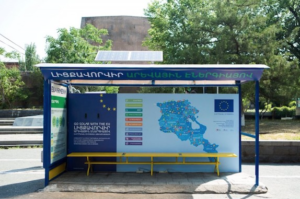Solar-Powered Bus Stops Begin Operating in Yerevan

Armenia’s capital has taken another major step towards solar-energized future. On Friday, Head of the European Union Delegation, EU Ambassador to Armenia Piotr Świtalski tested the city’s first solar-powered bus stop as part of the EU Energy Days 2017 initiative.
The Delegation of the European Union to Armenia has initiated the installation of solar panels at two bus stops of Yerevan to promote the use of renewable energy in the country. Situated on Moskovyan and Baghramyan streets, the bus stops will enable residents and visitors of Yerevan to charge their cell-phones and other digital gadgets with free solar energy. Each solar powered bus stop can fully charge up to 24 phones daily. Each phone requires 5 watt to charge. The charging duration depends on the brand and technical specifications of the gadgets.
Held under the umbrella of EU Energy Days initiative by the European Union Delegation to Armenia, its partner institutions and the EU-funded projects, a series of events took place from 3 to 7 July 2017 in Yerevan and regions to highlight the reforms in energy sector implemented with the support of the European Union as well as to showcase the recent developments and to share perspectives of fostering renewable, alternative and sustainable energy practices in Armenia through the EU-funded projects and institutional partners. The purpose of the week-long initiative was also to raise awareness on trends and actions of energy efficiency, security and diversification in Armenia among citizens, public and private institutions, businesses, CSOs and active youth groups.
The EU4Energy Week featured forum discussions, public talks and site visits to present the impact of EU-funded projects in energy sector and help Armenia’s urban and rural communities increase energy efficiency.
The EU Ambassador to Armenia Piotr Świtalski comments on the EU Energy Days in Armenia, “The energy sector in Armenia is and will continue to be a key priority for the EU for the coming years; it responds to one of the main constraints for economic growth and raises the living conditions of many Armenians in the regions as well as it helps to strengthen energy independence.”
The European Union has extended long-term assistance to increasing Armenia’s energy efficiency locally, regionally and nationally.
An important milestone for Armenia was joining the Eastern Europe Energy Efficiency and Environment Partnership (E5P) agreement in March, 2016. The agreement signed with the European Bank for Reconstruction and Development (EBRD) with a contribution of €10 million to E5P, enables Armenia to access grant funds of €20 million. The funds are projected for priority municipal energy efficiency and environmental projects, such as rehabilitation of water and waste water systems, solid waste management, street lighting and the insulation of public buildings.
A large-scale EU-funded project with a vital strategic role in the region is the Caucasus Transmission Network, implemented in partnership with KFW and EIB. It envisages construction of a cross-border energy exchange between Armenia and Georgia through a HVDC/back-to-back station. The project will foster diversification of energy supply in Armenia and regional integration.
Another major project targeting the energy sector is Access to Renewable and Efficient Energy in Municipalities Vayk and Spitak (AREEM). Supported by the European Union and implemented by Habitat for Humanity Armenia, it aims to save 15% to 30% energy in 45 residential and 2 public buildings of Spitak and Vayk towns, reduce CO2 emissions, increase awareness and knowledge of tenants in selected residential buildings on the importance of energy efficiency and increase capacity of Spitak and Vayk municipalities to implement sustainable energy projects.





